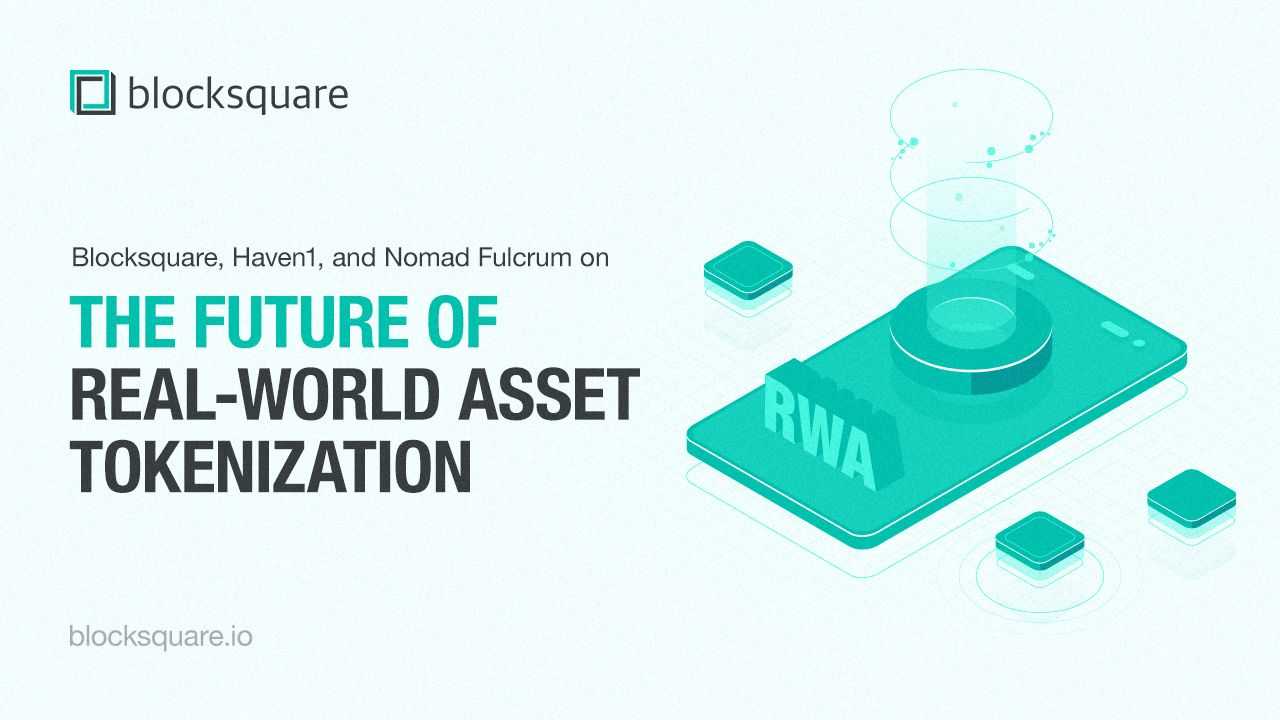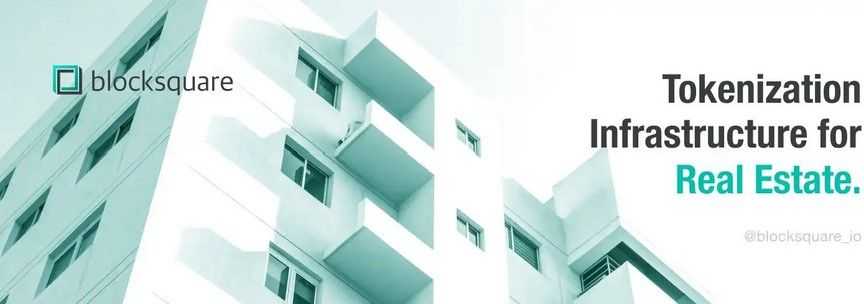The Future of Real-World Asset Tokenization: Insights from Blocksquare, Haven1, and Nomad Fulcrum
Tokenization of real-world assets (RWAs) is gaining momentum, reshaping traditional finance by offering greater liquidity, accessibility, and efficiency. In a recent Haven1 xSpace event, industry leaders Denis Petrovcic (CEO, Blocksquare), Abhishek Bansal (CPO, Haven1), and Pawel Laskarzewski (CEO, Nomad Fulcrum) discussed the current state and future of RWA tokenization.


The conversation covered key areas such as liquidity, regulation, compliance, and security, alongside the opportunities and challenges faced in bringing real estate, commodities, treasuries, and private credit on-chain.
Real Estate Tokenization: A Fully Operational Infrastructure
Blocksquare’s Mission
Denis Petrovcic, CEO of Blocksquare, introduced the company’s real estate tokenization infrastructure, which is fully operational and available for both entrepreneurs and institutions. The company provides tools for real estate businesses, startups, and financial institutions to launch their own tokenized property marketplaces.
“Blocksquare is here to bring real estate on-chain. We started back in 2017, officially in 2018, and today we’ve brought around $140 million worth of real estate assets on-chain, coming from more than 20 jurisdictions.”
Unlike traditional real estate investment vehicles such as Real Estate Investment Trusts (REITs), which primarily serve institutional investors, tokenization provides a more accessible model for individuals to invest in real estate without requiring ownership of entire properties.
How Tokenization Solves Real Estate’s Biggest Challenges
Denis highlighted the inefficiencies in traditional real estate investment:
- High entry barriers: Large capital requirements restrict access to high-quality real estate assets.
- Lack of liquidity: Selling a property can take months or even years.
- Limited market access: Investors typically buy property only in familiar, local markets.
By tokenizing real estate, these issues are addressed through fractional ownership, automated transactions, and 24/7 tradability.
“With tokenization, you can create a portfolio similar to what a REIT does, but with an investment of $100, $1,000, or $10,000 instead of millions.”
Denis also explained that real estate syndication, where investors pool money to buy properties, suffers from lack of liquidity and difficult exits. Tokenization eliminates these problems by allowing investors to sell their shares at any time on a marketplace.
Security, Regulation, and Compliance: The Road to Institutional Adoption
Navigating the Regulatory Landscape
The panelists emphasized the importance of compliance and regulation in the growth of RWAs.
Pawel Laskarzewski from Nomad Fulcrum highlighted how global regulation is catching up to blockchain technology, with Europe taking the lead through MiCA (Markets in Crypto-Assets Regulation), DLT Pilot Regime, and MiFID II.
“In the next few years, we will see a major regulatory tsunami in crypto. Many companies will disappear if they don’t adapt.”
Denis pointed out that tokenized securities fall under MiFID II in Europe and not MiCA, meaning companies must carefully structure their token offerings to comply with different regulations.
“MiCA mainly regulates stablecoins and utility tokens. But if you tokenize shares of a company that owns a property, that falls under MiFID II. Many people don’t realize this distinction.”
To ensure compliance, Blocksquare works with top law firms across Europe to create legally sound frameworks for tokenized real estate investments.
Haven1’s Compliance-First Approach
Haven1 is designed as a trust-resistant blockchain that ensures all participants undergo identity verification (KYC/KYB). This protects users from fraud, scams, and security risks commonly associated with decentralized finance (DeFi).
Abhishek Bansal, CPO at Haven1, explained:
“Haven1 enables builders to verify user identities with a single line of code. Unlike Ethereum, where projects bear the full burden of compliance, Haven1 spreads this cost across the network, making it far more efficient for RWAs.”
This pre-built compliance infrastructure is designed to attract institutional investors and improve trust in blockchain-based assets.
Expanding RWAs: Mutual Funds, Private Credit, and Institutional Adoption
While real estate is a prime candidate for tokenization, the panelists also discussed other asset classes moving on-chain, including mutual funds, private credit, and treasuries.
Pawel revealed that Nomad Fulcrum is working on:
- AI-powered DeFi strategies for RWA transactions in commodities, treasuries, and currencies.
- Mutual funds integrating RWAs to provide diversified, yield-generating investment products.
- Liquid-staked RWAs, allowing investors to trade income-generating assets on secondary markets.
He emphasized that composability is key to mass adoption, allowing investors to earn multiple layers of returns through staking, lending, and automated yield strategies.
“The institutional capital coming into RWAs today is shaping the future of finance. BlackRock, JPMorgan, and Citibank are entering this space because tokenization offers the efficiency and liquidity that traditional markets lack.”
Abhishek agreed, stating that private credit markets will likely see the most rapid growth in the coming years due to their high demand for financing and attractive yields.
“Private credit is growing at an incredible rate. We’re working with builders to bring new RWA assets on-chain, including real estate, treasuries, and private business investments.”
The Future of RWA Tokenization: What’s Next?
1. Scaling Real Estate Tokenization with Oceanpoint
Denis shared that Blocksquare is developing Oceanpoint, a decentralized liquidity engine for tokenized real estate.
“Oceanpoint will allow real estate-backed tokens to be staked and used within DeFi, making them as liquid as traditional cryptocurrencies.”
This integration will provide immediate tradability and yield-generation opportunities for tokenized properties, making real estate investing more attractive to both institutional and retail investors.
2. Institutional Adoption and Liquidity Growth
With increasing regulatory clarity and trusted blockchain infrastructure, RWA tokenization is expected to grow exponentially.
Pawel predicted that mass adoption is already happening, as evidenced by the billions flowing into tokenized assets from institutional players.
“Larry Fink from BlackRock wants to tokenize everything. The infrastructure is ready, the capital is coming in, and we’re at the beginning of a major transformation.”
3. Expansion into New Asset Classes
Haven1 is working with multiple partners to expand RWA tokenization into new sectors, including:
- Treasury bonds and government debt
- Private equity and venture capital
- Revenue-generating businesses
“In five years, we could see over a trillion dollars in RWAs on-chain. This is the next evolution of finance.” – Abhishek Bansal
Conclusion: Now Is the Time to Build in RWAs
The panelists agreed that the best time to build in RWA tokenization is now. With fully operational infrastructure from Blocksquare, compliance-focused blockchain solutions from Haven1, and DeFi-powered investment products from Nomad Fulcrum, the foundation is set for mass adoption.
“If you’re thinking about getting into this space, now is the time. Regulations are in place, institutions are moving in, and blockchain technology is ready to scale.” – Pawel Laskarzewski
For entrepreneurs, investors, and institutions, the message is clear: Real-world asset tokenization is no longer a theory—it’s a reality.
